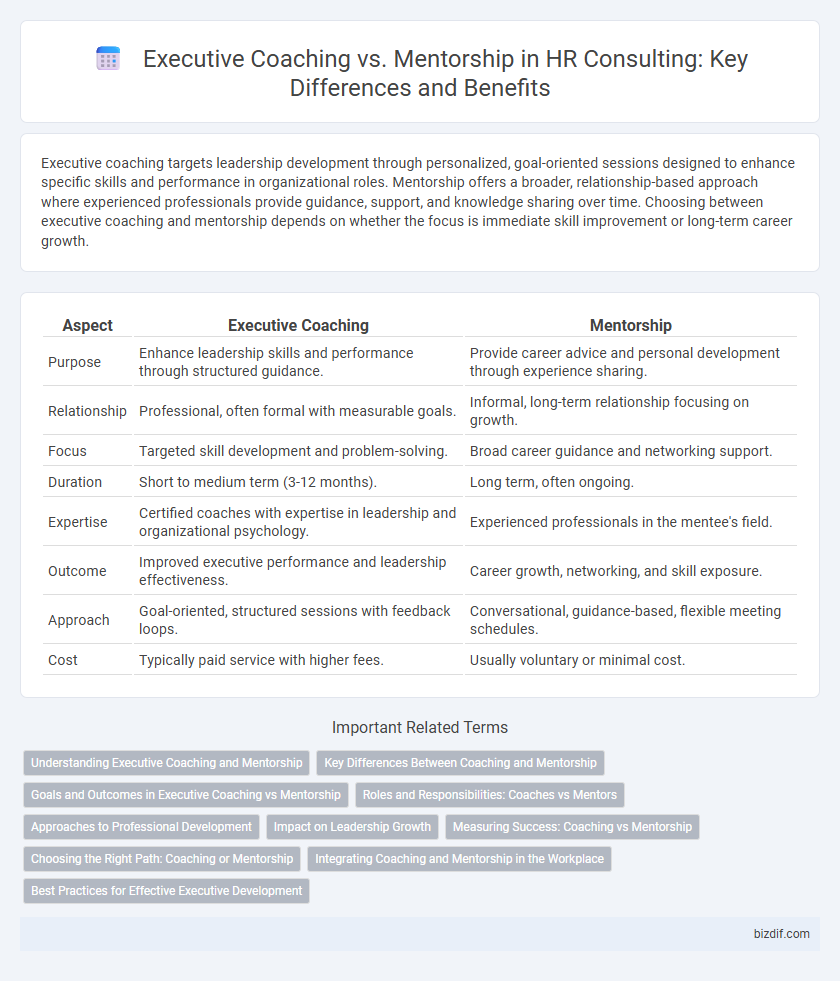Executive coaching targets leadership development through personalized, goal-oriented sessions designed to enhance specific skills and performance in organizational roles. Mentorship offers a broader, relationship-based approach where experienced professionals provide guidance, support, and knowledge sharing over time. Choosing between executive coaching and mentorship depends on whether the focus is immediate skill improvement or long-term career growth.
Table of Comparison
| Aspect | Executive Coaching | Mentorship |
|---|---|---|
| Purpose | Enhance leadership skills and performance through structured guidance. | Provide career advice and personal development through experience sharing. |
| Relationship | Professional, often formal with measurable goals. | Informal, long-term relationship focusing on growth. |
| Focus | Targeted skill development and problem-solving. | Broad career guidance and networking support. |
| Duration | Short to medium term (3-12 months). | Long term, often ongoing. |
| Expertise | Certified coaches with expertise in leadership and organizational psychology. | Experienced professionals in the mentee's field. |
| Outcome | Improved executive performance and leadership effectiveness. | Career growth, networking, and skill exposure. |
| Approach | Goal-oriented, structured sessions with feedback loops. | Conversational, guidance-based, flexible meeting schedules. |
| Cost | Typically paid service with higher fees. | Usually voluntary or minimal cost. |
Understanding Executive Coaching and Mentorship
Executive coaching focuses on enhancing leadership skills through personalized, goal-oriented sessions led by certified coaches, targeting performance improvement and strategic thinking. Mentorship involves experienced professionals offering guidance, advice, and knowledge based on their career journeys to foster personal and professional growth. Both approaches support executive development but differ in structure, objectives, and the nature of the relationship.
Key Differences Between Coaching and Mentorship
Executive coaching targets specific leadership development goals through structured, short-term engagements, emphasizing performance improvement and accountability. Mentorship involves a long-term relationship fostering overall career growth and personal development through guidance and shared experiences. Coaching is often directive and goal-oriented, while mentorship is more informal and centered on broad professional support.
Goals and Outcomes in Executive Coaching vs Mentorship
Executive coaching targets specific leadership goals with measurable outcomes such as enhanced decision-making, strategic thinking, and performance improvement, driven by personalized action plans and accountability. Mentorship emphasizes long-term career development and knowledge sharing, fostering professional growth through guidance and experience-based advice. The outcome of executive coaching is often immediate skill enhancement and goal achievement, whereas mentorship cultivates enduring relationships and holistic professional progress.
Roles and Responsibilities: Coaches vs Mentors
Executive coaching involves a structured, goal-oriented process where coaches focus on developing specific leadership skills, accountability, and performance improvement through personalized strategies. Mentors provide guidance based on their own experience, offering advice, support, and broader career insights to foster long-term professional growth. Coaches act as facilitators of change with defined metrics, while mentors serve as trusted advisors contributing to holistic development.
Approaches to Professional Development
Executive coaching centers on personalized goal-setting and performance improvement through structured sessions with certified coaches who use evidence-based techniques. Mentorship emphasizes long-term relationship building, knowledge sharing, and career guidance often provided by experienced professionals within the same industry. Both approaches enhance professional development by fostering skill growth, self-awareness, and leadership capabilities tailored to individual career paths.
Impact on Leadership Growth
Executive coaching accelerates leadership growth by providing personalized feedback, goal-setting strategies, and accountability tailored to individual strengths and challenges. Mentorship fosters leadership development through experience sharing, guidance, and networking opportunities that build practical insights and long-term relationships. Both approaches enhance leadership effectiveness, yet coaching often delivers measurable performance improvements, while mentorship nurtures holistic professional growth.
Measuring Success: Coaching vs Mentorship
Measuring success in executive coaching involves tracking specific performance metrics such as goal achievement, leadership competency improvements, and behavioral changes through 360-degree feedback and performance reviews. Mentorship success is often assessed through qualitative indicators like mentee satisfaction, career progression, and enhanced professional networks, emphasizing long-term personal and professional growth. Data-driven coaching ROI and mentorship impact evaluated via retention rates and promotion frequency provide complementary insights for HR consulting strategies.
Choosing the Right Path: Coaching or Mentorship
Executive coaching offers personalized, goal-oriented guidance tailored to leadership development and performance improvement, typically led by certified professionals. Mentorship provides long-term, experience-based support emphasizing career growth through shared knowledge and relational trust. Selecting between coaching and mentorship depends on immediate leadership challenges versus ongoing career development needs within HR consulting frameworks.
Integrating Coaching and Mentorship in the Workplace
Integrating executive coaching and mentorship in the workplace enhances leadership development by combining personalized skill-building with experiential guidance. Executive coaching focuses on targeted performance improvement through professional techniques, while mentorship fosters long-term growth via knowledge sharing and relationship building. Organizations that blend these approaches achieve higher employee engagement, accelerate talent development, and cultivate a resilient leadership pipeline.
Best Practices for Effective Executive Development
Executive coaching drives targeted leadership growth through personalized feedback, goal setting, and accountability, leveraging tools like 360-degree assessments to identify specific development areas. Mentorship offers experiential learning and long-term career guidance by connecting executives with seasoned leaders who share insights and expand professional networks. Combining structured coaching frameworks with mentorship's relational support maximizes executive development outcomes, promoting sustained performance improvements and strategic skill acquisition.
Executive coaching vs mentorship Infographic

 bizdif.com
bizdif.com